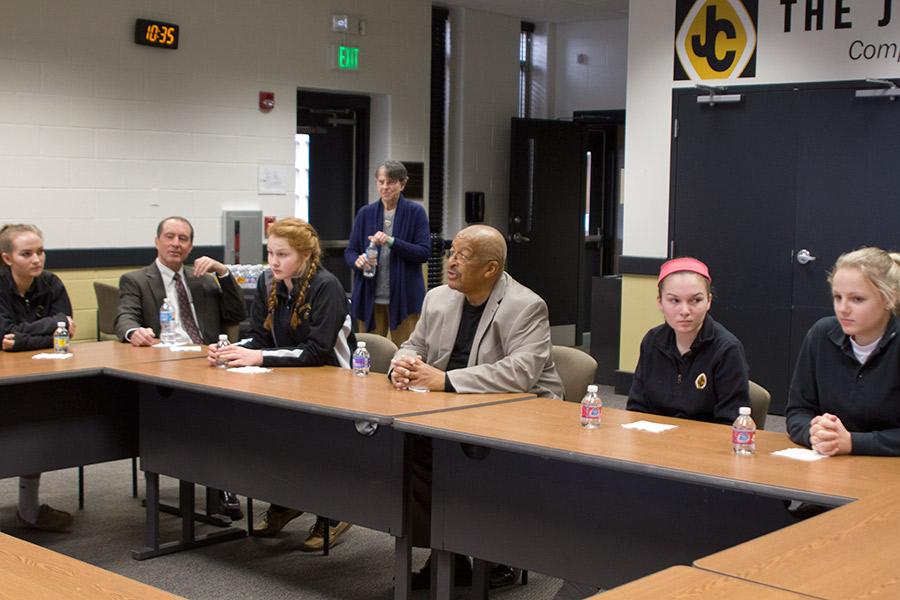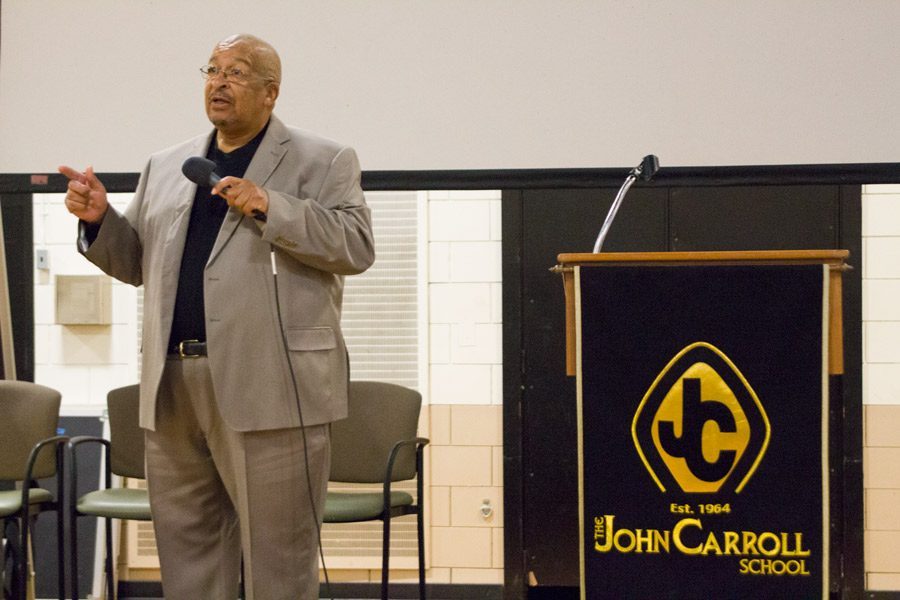Sergeant Baxter enlightens community on racial discrimination
On Jan. 18, in honor of Martin Luther King Day, Sergeant Wendell Baxter shared his experiences of segregation in Bel Air and his journey as the first black police officer in Harford County. He spoke of racial injustices and emphasized how everyone deserves dignity and respect.
Sergeant Wendell Baxter addresses the JC community during the Martin Luther King, Jr. assembly on Wednesday, Jan. 18. Baxter reflected on growing up in Bel Air as a young black man in Harford County.
As he turns the bend on the track, he begins to run faster and the excruciating pain increases. The hot asphalt singes the bottoms of his bare feet while his fellow white competitors’ feet are protected by their shoes. Just go faster, he tells himself. To suppress the pain, he pushes himself harder, passes the finish line, and wins the state championship for the rest of his team.
Sergeant Wendell Baxter had never heard of the needle-nose spiked shoes his white competitors were wearing and was unable to wear any shoes on the track, due to the color of his skin. This was just one more thing Baxter was forced to adapt to, as he was used to having things of lesser-quality growing up.
Baxter grew up in the town of Bel Air and encountered a few experiences of segregation including having to order sandwiches from the back door, not being able to drink from the same water fountain as his peers, and being told, “We can’t serve you” when ordering from a restaurant.
Throughout Baxter’s talk to students on Jan. 18, he reiterated his inability to grasp the reasoning behind racial discrimination, even today. “I just don’t understand,” he said. “It doesn’t rub off. We both bleed. Your blood is no different than my blood. It all comes out red. Your bones, when we put them back together, are no different than the way my bones go back together.”
Baxter became too familiar with the idea of higher-quality objects belonging to whites. According to Baxter, “Nothing was new,” and that blacks were always given “second class” objects in school. Baxter attended Hickory Elementary School, and even there blacks weren’t given the “best.” “We didn’t get new desks. We received the desks that came from Bel Air High School that were used. Sometimes they would re-sand the tops, other times they did not,” he said.
Even when he was working with a white family, Baxter recalls how he was treated differently whenever the father was around. “When the father wasn’t home, we all sat down at the same table and ate. But if the father was there, you didn’t eat off the china his father ate off of. You ate off paper plates and plastic knives and forks. That’s how he was,” he said.
In 1971, Baxter became the first black police officer for the town of Bel Air and continued to serve for 40 years. “When I became a police officer, I was surprised. I did not think that I would be chosen to be a police officer in this county because I knew this county when we didn’t have black people in those kind of positions,” he said.
While Baxter was a police sergeant, he also worked as an EMT medic. While on the job he didn’t treat many blacks, but he “sure has treated a lot of white people and other races.” As a medic, he only had one bad incident where race became an issue when helping a woman in labor.
When her husband saw he was black, the man looked at Baxter and said, “I don’t want him touching my wife.” Baxter respectfully replied, “Okay, have a nice day” and started to leave until the mother-in-law stopped him and said, “I want you to take care of my daughter.” After the baby was delivered, Baxter and the mother-in-law became close friends.

JC student community leaders sit down with MLK Assembly guest speaker, Wendell Baxter, to discuss what can be done in today’s society to encourage diversity. Baxter spoke at the assembly expressing his opinions on the current and former state of diversity and discrimination in Harford County.
At age 72, Baxter continues to give back to the community as the Chairperson of the Human Relations Commission of Harford County as well as volunteering for the Red Cross. “I try every day to make a difference. I don’t want to live in the past. We’ve got to change,” he said.
In hindsight, Baxter admits we have made great progress due to the spread of respect and how through giving respect, he collected so much of it. “I am proud to be a Bellarion,” Baxter said. “If you treat people with respect, there’s no problem.”
Although great strides have been made, Baxter believes it to be just the beginning. “I’ve seen changes in Harford County, but we haven’t made all the changes,” he said. According to Baxter, the catalyst for this change is the youth, who are the “faces of change.”
Baxter suggests these changes start right here in our community. A simple way to do that, he states, is by trying to represent all minorities of the community. “People get discouraged because they’re not asked – but you need to ask to get others involved,” Baxter said.
Another thing that could be done is “keep [the conversation] rolling. It can’t be lip service,” Baxter said. According to Baxter, this is a “new time” and these problems need to be addressed rather than pushed off. It needs to spoken with “what you believe. You can’t live in a box.”
With this, Baxter believes more unity and respect will be encouraged and “such hype” over topics such as interracial marriage won’t occur. “I hope someone in this [school] has left a legacy of understanding and love,” he said. “I hope I’ve left a good legacy because I treated everyone the way I wanted to be treated – with respect.”
After all, “You have something to offer, we all have something to offer. We are all entitled to our day,” Baxter said.
Caroline Cooney is the Editor in Chief and Pia Scotto is a Community Editor for The Patriot and jcpatriot.com.



